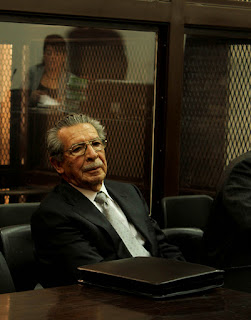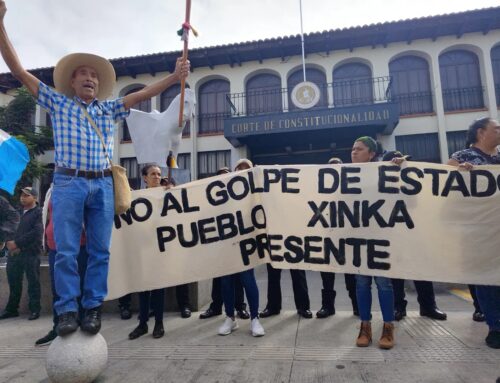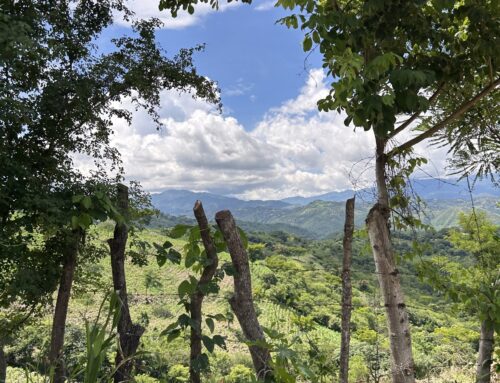A personal reflection by Phil Neff, Guatemala Accompaniment Project Coordinator for NISGUA
A cold evening fog had fallen over the Plaza of Human Rights outside Guatemala City’s Court Tower, where two hundred survivors of massacres perpetrated by the Guatemalan Army waited, exhausted and anxious, for Judge Patricia Flores to deliver the court’s verdict—would former dictator Efraín Ríos Montt be charged with genocide? As Judge Flores called the courtroom to session in the tower above, techie activists in the plaza struggled to provide a clear audio and video feed for the crowd below. Though the nuances of her verdict were lost in echo and feedback, the fragments of words and phrases we did hear raised waves of hope; incomprehensible, almost unbelieving hope.
First, Judge Flores methodically affirmed key principles of humanitarian law drawn from the Geneva Conventions and the U.N. Genocide Convention, asserting Guatemala’s constitutional obligation to abide by international law. Then, a series of firm, direct accusations, punctuated by the repeated emphasis of the formal direct address, “Usted”: “You, Señor Efraín Ríos Montt, had knowledge of military plans which had the objective of exterminating the civilian population.” “You, Señor Efraín Ríos Montt, were the Commander in Chief of the military and had knowledge of the execution of these plans.”
 |
| Efraín Ríos Montt in court on charges of genocide. Judge Carol Patricia Flores is reflected in the glass behind Ríos Montt. (Photo: Roderico Yool Diaz) |
The Judge described testimony of rape, forced labor, torture, and assassinations. “We can establish,” she said, “that these are acts so degrading, so humiliating, that there is no justification.” “You, Señor Efraín Ríos Montt, could have prevented these crimes.” And, finally, Judge Flores stated that in the Maya-Ixil region of central Guatemala, during the years 1982 to 1983, the State had systematically ordered genocide. “We agree with the prosecutor’s judgment that you, Señor Efraín Ríos Montt, probably participated in these acts of genocide and crimes against humanity.” With that, history was made: Efraín Ríos Montt will be tried for the Guatemalan genocide.
The expectant silence of the plaza below erupted in applause and shouts of “¡Asesino! ¡A la carcel!” tension erased from faces that now shone with exuberant smiles, hugs and handshakes exchanged as a bandolier of firecrackers exploded, scattering the pine needles and carnations of a large ceremonial carpet that spelled out “Impunity: Neither yesterday nor today.” I watched as members of the survivors’ group Association for Justice and Reconciliation reacted to the culmination of their decades long campaign for justice. Don Emilio, a former president of the Association, gripped the hand of current president Don Benjamin, saying, “Tomorrow we will celebrate this historic event. Our struggle has become reality. It has all been worth it.”






Leave A Comment